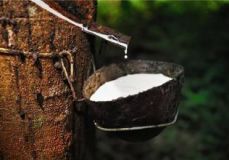Decrease of Rubber Production and Increase of Price
Mumbai - the Indian commodity exchange's rubber futures traded higher on the 15th as prices rose in Kerala's main spot market due to a shortage of supply, analysts said.
Tyre companies are willing to pay higher prices for rubber, but there are few sellers. Biju Thomas, a trader based in Kerala, said that in the summer, rubber cutting rates are usually low.
In addition, many small growers have stopped collecting rubber because high temperatures and low prices have reduced production, he said.
ICEX rubber contracts rose 0.12% in June to close at RS 13618 per 100 kg. In Kochi and cotayan, the widely traded RSS-4 is priced at 134-135 rupees per kilogram, up 1 rupee from Tuesday, traders said.
In global markets, natural rubber prices on the Tokyo Mercantile Exchange also ended higher as Japanese stocks rose. Japan's Nikkei index rose 0.6% to close at 21188.56.
However, gains were limited by weak crude oil contracts on the New York Mercantile Exchange and a strong yen against the dollar. Rubber prices are inspired by crude oil, which is used to produce synthetic rubber, an alternative to natural rubber.
In Thailand, the price of rss-3 rose 37 cents to $175.60 per 100 kg. However, in Malaysia, smr-20 grades fell by 30 cents to $149.35 per 100 kg, according to rubber sheet data.



